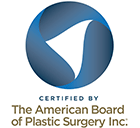
 |
    |
What Should I Expect from the Consultation?Making the Most of Your Plastic Surgery ConsultationThis article details what to expect from the initial consultation with a physician for elective cosmetic surgery. It assumes that you have already done the appropriate background search and arrived at 2-3 possible choices. The process of choosing physicians is discussed in the article by Dr. Revis entitled How to Select a Plastic Surgeon. Considering at least 2 surgeons before making a decision is encouraged. Some surgeons may have more experience with surgical procedures and with the complications that may arise, while other surgeons may have more recent and possibly more extensive training in the latest surgical techniques. A second opinion is advisable, preferably with a surgeon who is not associated directly with the first surgeon. It may be helpful to have someone accompany you to your consultation; opinions from a trusted friend or relative may be valuable. A child or adolescent should always be accompanied by at least one parent. The person who accompanies you should be the person who is going to care for you during the recovery period. The Surgeon's OfficeUpon arrival to the physician's office, typically you will be greeted by a receptionist and asked to fill out a new patient information form detailing your specific information and health history. When completing this form, be completely honest and thorough, as the information you provide helps to prevent complications during your care. When asked about medications, be sure to include any vitamin or herbal preparations, as these can affect your blood pressure and clotting ability. Honesty regarding your use of tobacco and alcohol also is very important, as this may have a profound impact on your recovery period and incision healing. The receptionist may give you a practice brochure or resume detailing the surgeon's background, training, experience, and board certification status. Confirm that the information is consistent with the background data you gathered. Ask the surgeon to explain any discrepancies you discover. If attempts are made to deceive you, you should find another physician. While waiting, take note of the following:
When invited from the waiting area into the office, take note of the following:
The staff, office decor, and scheduling procedures are an extension of the surgeon's personality. Your satisfaction with these elements is very important. Before Meeting the SurgeonNurseInitially, you may meet with a nurse or other patient coordinator. This staff member is familiar with the surgeon's style and aesthetic sense and usually can competently assess a patient and answer many questions. This staff member also may become your liaison with the physician when the physician is not immediately available. You will come to know the nurse or patient coordinator quite well over the course of your surgery and recovery period, so it is wise to befriend this important staff member. In addition, you can quickly get a sense of whether or not a pleasant work environment and job satisfaction exist in this office setting. TourYou may be provided with a tour of the facility, particularly if the physician performs surgery in the office. Take note of the cleanliness of the facility. Would you feel comfortable having surgery performed in the office? ChaperoneAppropriate gender representation (among patient, assistant and surgeon) should be present when the surgeon is in the room with you. The chaperone acts as a witness to corroborate or deny any claim of untoward behavior between physician and patient. The door should be left ajar if the chaperone has to leave the room. Meeting the SurgeonFinally, you will meet the surgeon. The length of initial consultation may be as brief as 15 minutes or longer than an hour, depending on the complexity of issues involved. Initial impressions are extremely important. Is the surgeon dressed and groomed in accordance with your idea of professionalism? This may indicate to you immediately whether or not the surgeon is someone in whom you wish to place your trust. The surgeon will introduce himself or herself and offer a few introductory remarks. The surgeon should clearly explain his or her credentials, education, training, and experience. Feel free to ask about the surgeon's background. A well-trained surgeon is proud of his or her accomplishments and will gladly share them with you. You also have a right to know the status of malpractice claim and awards. It should not be considered an insult to inquire about these issues. Avoid a surgeon who has multiple malpractice claim or awards. Also make sure that the surgeon carries malpractice insurance; not all states require physicians to do so. The ConsultationSeveral factors regarding surgery should be discussed with the physician during initial consultation, including procedure, location, anesthesia, recovery, and cost. Each of these will be discussed. A clear understanding of these factors will help you to make a more informed decision. The surgeon should inquire about your concerns, priorities, and motivations for pursuing surgery, as well as your fears. The surgeon also should try to insure that you have reasonable expectations for the outcome, and, therefore, should explain what is possible and what is not possible. Questions You Should Ask About the Procedure
Avoid the surgeon who does things only one way. The beauty of cosmetic surgery as a practitioner is that there are many ways of accomplishing the desired result. Your surgeon should be able to discuss options with you, fully explaining the advantages and disadvantages of each and why one may be recommended over another. Questions You Should Ask About the Surgeon's Experience with the Procedure
Avoid the surgeon who is not appropriately trained in the type of surgery you desire. You may want to ask to speak with other patients who have had the procedure. Most surgeons maintain a list of patients willing to speak with potential new patients. To protect privacy, the surgeon most likely will have the established patient call you rather than give you the patient's phone number. Questions You Should Ask About Logistical Matters
SmokingThe surgeon also will discuss smoking with you. Smoking may lead to severe complications and wound healing problems. Your surgeon may not perform certain procedures if you are unwilling to quit smoking for a certain period of time preoperatively and post-operatively. You should view elective cosmetic surgery as a chance to change your life. You can improve your appearance through surgery and improve your health through smoking cessation and improving diet and exercise habits. You should end up looking better, feeling better, and living longer. Where Your Surgery Will Be PerformedSometimes you have a choice in the location of your surgery, whether in a hospital, ambulatory surgery center, or office surgery setting. Some surgeons prefer to perform the majority of their procedures in their own office surgery suites as a convenience to themselves and to save money. Others prefer to do only minor procedures in the office while performing more major operations in a local hospital or ambulatory surgery center. The factors to be considered when choosing between office and hospital surgery are discussed below. Office Surgery SuitesMany physicians have surgical suites in their offices where they perform the majority of their operations. The growth in office-based surgery was influenced by escalating costs of hospital care and the ability of properly trained physicians to perform procedures safely in properly accredited office surgery settings. Due to the differences in overhead, procedures performed in an office setting often are slightly less expensive than those performed in a hospital or ambulatory surgery center. Some hospitals and ambulatory surgery centers, however, have responded to the competition by lowering their fees. ConvenienceOffice surgery provides convenience for you and your family by providing for all of your needs in one facility. This approach streamlines service and healthcare delivery in a single facility and is also comfortable and convenient for the surgeon. SafetyOffice surgery is safe when performed by a properly trained physician with appropriate board certification and the necessary safety equipment present and a sound plan to implement in the event of a life-threatening emergency. Untoward events can occur in any surgery setting, even in the hands of the most skilled and experienced surgeons. Many complications arise from circumstances beyond the surgeon's control (eg, certain wound infections). On occasion, complications can be the result of the surgeon's lack of adequate training to perform the procedure, an improperly equipped or accredited facility, or an improperly trained staff. RegulationAny physician, regardless of his or her training, can open an office surgery suite and advertise as a plastic surgeon and perform plastic surgery on the unsuspecting public. Regulation of office surgery settings is currently voluntary and often substandard. New laws are being passed in an attempt to correct this potential problem. If you decide to have your surgery in an office surgery suite, choosing a physician whose surgery suite is accredited adds an additional level of quality assurance. Accreditation requires that physicians are properly credentialed and that facilities are appropriately equipped and staffed. The American Association for Accreditation of Ambulatory Surgery Facilities (AAASF) is one organization that provides accreditation for office operating rooms. The AAASF may be contacted at 847-949-6058. ContingenciesDespite thorough training of physicians and staff and accreditation of facilities, emergencies can occur during an office procedure. Emergency plans must be in place and be able to be activated immediately. The surgeon and staff must be familiar with how to activate the emergency system and what each person's role is in the event of an emergency situation. You should inquire about the emergency plans by asking questions as follows:
Do not have surgery performed in any office where you are uncomfortable with the emergency procedures. Because your safety is Dr. Revis' first and foremost concern, he has chosen not to perform office-based surgery. While your procedure may be slightly more expensive than with a surgeon who performs surgery in his or her office, the additional peace of mind is worth the minimal difference in cost in Dr. Revis' opinion. Hospital or Ambulatory Surgery CenterBroad Range of ServicesHospitals provide a broad range of services and specialists available close by should any serious complications arise. If you have other medical conditions that make the proposed procedure more risky than usual, your surgeon may opt to perform the procedure in a hospital setting. You should ask your surgeon whether or not your other medical conditions warrant a hospital setting for your surgery. Physician PrivilegesTo obtain hospital privileges to perform a procedure, surgeons must provide proof of education, training, and experience. This provides an added level of assurance that the surgeon has been properly educated and trained. AccreditationMuch like board certification for a physician, the Joint Commission on Accreditation of Healthcare Organizations (JCAHO) establishes a baseline standard of excellence among hospitals and is recognized nationwide. You should ask if the hospital where your surgery will be performed is accredited by JCAHO. The JCAHO may be reached at 708-916-5800 for confirmation. Your wishes for a particular surgery location should be considered, but the ultimate decision should be based on the procedure you are having and your overall health. Avoid a surgeon who operates in his or her office but does not have hospital privileges to perform the same operation. Also avoid a surgeon who operates in his or her office without some accreditation by an ambulatory surgery accreditation association. And finally, avoid any physician claimng to be a plastic surgeon or cosmetic surgeon if they are not certified by the American Board of Plastic Surgery. AnesthesiaAnesthesia is a complex and essential part of any surgical procedure and must be performed safely. Anesthesiologists and certified nurse anesthetists are specialists with experience in administration of all types of anesthesia. Surgeons also are trained in some types of anesthesia and routinely administer local anesthetics, as well as intramuscular or oral sedation to their patients in conjunction with the surgical procedure. Several types of anesthesia exist. Your wishes should be considered, but ultimately, the decision as to which type to use is based on your health and the proposed procedure. General AnesthesiaThe deepest form of anesthesia is called general anesthesia. The person providing anesthesia takes over the responsibility of breathing for you. You are sedated and feel no pain. You are unconscious during the procedure and will not remember it. Deep Intravenous SedationDeep intravenous sedation, termed by some as twilight sleep, is a combination of local anesthetic injected at the site of surgery and intravenous sedation. You breathe for yourself, but you are in a deep sleep throughout the procedure and feel no pain. More than likely, you will not remember the procedure. Regional AnesthesiaRegional anesthesia numbs a specific portion of the body and is administered by anesthetizing the nerves coursing to that region. This typically is combined with intravenous sedation. You will not feel the procedure, but you may be awake during all or part of the procedure. Local AnesthesiaLocal anesthetics alone may be used for certain small procedures. The operative site is numbed, but you remain wide awake and aware of the procedure being performed. To prevent anxiety, you may be given a small amount of sedation orally, intravenously, or intramuscularly. Meeting the Anesthesia ProviderYou should ask to meet your anesthesia provider prior to surgery. This gives you the opportunity to discuss with your provider the appropriate type of anesthesia for your proposed surgery and any specific concerns regarding your safety and health. Recovering From Your ProcedureThe recovery period is an important part of the recovery process. Questions you should ask regarding your recovery process include the following:
Answers to these questions will help you properly prepare for the post-operative period. Cost of Your ProcedureDuring the information-gathering phase of your search, you may have obtained fee information by phone from the office staff of prospective physicians. During the consultation, you will receive a quote of the surgery fees, which should be provided in written form for you to take with you. Consultation FeesIn competitive regions, surgeons tend to waive consultation fees. In areas with fewer surgeons, consultation fees may not be waived. Even within highly competitive markets, however, some surgeons may charge fees while others may not. Surgical FeesSurgical fees vary state to state and within the same city or region. Legally, surgeons cannot discuss fees with other surgeons, so fees may fall over a very wide range. The most expensive surgeon may not be the best surgeon or the one you should choose. Likewise, the most inexpensive surgeon may not be the worst surgeon or the one you should avoid. If new to the community, the surgeon may have the lowest fees in the area and still be a very skilled surgeon. Hence, you should not judge a surgeon's skills by the fees charged. You can, however, determine if you can afford a physician. Do not waste your time or the physician's by visiting for a consultation if you cannot afford the fees. Global FeesMake sure that the fees you are quoted are global fees (ie, all costs are included). The costs typically involved in surgery include the surgeon's fee, the fee for anesthesiology, and facility fees; implants or other prostheses, special garments, perioperative skin care required, and preoperative testing and examination costs. Other factors may also influence costs. You should ask the following questions:
Revision FeesTouchups may be required, particularly with liposuction, and do not indicate error or negligence on the part of the surgeon. Touchups are an inherent risk of some procedures and should be explained preoperatively. Be sure to ask who will absorb the cost of any necessary revisions or touchups. Frequently, the surgeon charges only the facility and anesthesiology fee for revisions and touchups and waives the surgeon's fee. Payment PoliciesIf the surgeon operates in his or her office, you probably will be asked to pay one lump sum prior to surgery. If the surgeon operates in a hospital or ambulatory surgery center, it may work one of two ways: The surgeon may collect the entire fee and reimburse the hospital, or you may be asked to make part of the payment to the surgeon and the remainder to the hospital. Pertinent questions include the following:
PhotographySome physicians use photographic imaging to project what you might look like after surgery, but these are computer simulations. Be aware that these images are a marketing tool only and represent an ideal goal; in no way do these images guarantee your outcome or the skill of the surgeon or warranty your surgery. The images may facilitate communication between you and your surgeon, helping you understand each other's opinions and preferences. They also may be used to demonstrate potential incision sites. The surgeon also may display photos of prior patients who underwent your proposed procedure. Again, these photos are not a guarantee of the results you will achieve. The photos will give you an idea of the best results in this surgeon's hands and give you an appreciation of the surgeon's aesthetic sense. All surgeons eventually have patients who develop complications, and all patients are photographed. If the surgeon shows you only beautiful results, ask to see photos of bad results, particularly poor scarring and wound healing and patients needing touchups. Do not believe a surgeon who claim to have encountered no complications or have no photographs of bad results. Being photographed may be unsettling, particularly if breasts or genitalia are exposed. However, this is an essential part of the planning process. These photos will be used to plan the operation and provide a record of your preoperative appearance. With your written permission, the surgeon may use these photos for educational purposes, for demonstrating results to other patients or physicians, or for publication in professional literature. Making Your DecisionAfter discussing with the surgeon all of the factors involved with your proposed procedure, you should have a sense of whether or not this surgeon is the right choice for you. Take note of and consider the following: Did the surgeon:
Do you:
Answers to these questions should provide you with the comfort you need to choose this surgeon. However, because you will have been overwhelmed with information in an unfamiliar environment, you are urged not to make any hasty decisions. You will be provided with reading material on the proposed procedure, which may include preoperative and post-operative instructions and a consent form. Read this information thoroughly and ask questions about anything you do not understand. It may take several visits to the same surgeon's office before you have all of your questions answered and are ready to commit. Do not feel pressured to sign up for surgery on the spot. Any reasonable surgeon understands you may need time to think it over and discuss it with family, personal physician, or other surgeon. If you are considering this surgeon, ask the scheduling secretary for the surgery schedule prior to leaving the office. This will give you an idea of when you could have the procedure done if you book it in the near future. Also, ask when the physician will be away. You probably should not schedule surgery the day before the physician's vacation starts. You may want to plan your surgery to take advantage of vacation time from work. A certain time of year also might be better if you are less busy. Summer can be a good time to have elective surgery, because many people confine their activities to indoors due to the heat and UV rays. The decision for surgery is an important one. Explore and evaluate the opinions of family and trusted friends. However, the final decision should be yours. In addition, your priorities should be emphasized, not those of the surgeon. Ideally, the surgeon is there to listen, offer advice and personal opinion, and offer options to help you achieve the desired result. The surgeon should not be allowed to make your decision for you, nor should you expect that from the surgeon. Each person has a unique self-image and sense of beauty, and it is important for your surgeon to understand your feelings and to work with you to help you achieve your goals. Ultimately, you must understand the procedure well enough to make an informed decision and trust the surgeon you choose. Good luck in finding Dr. Right. However, realize that in addition to luck, or perhaps in place of it, it takes time and dedication to do the appropriate background checks to be an informed consumer in the world of elective cosmetic surgery. You will know when you have found the right combination of surgeon, procedure, timing, and cost.
For further information, please contact our office at (954) 630-2009 or you may email Dr. Revis. Email: DrDonRevis@hotmail.com.
|
|
|
Copyright 2022 South Florida Plastic Surgery Associates |